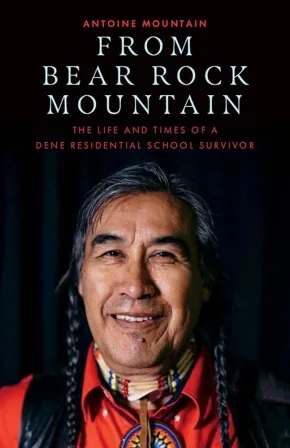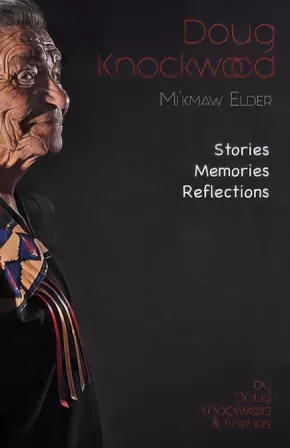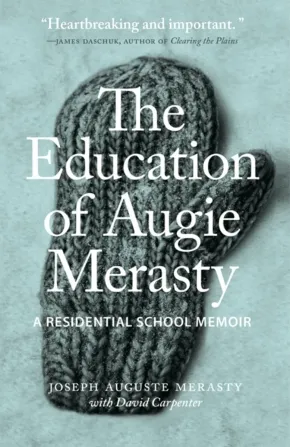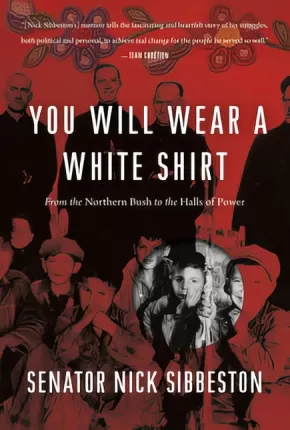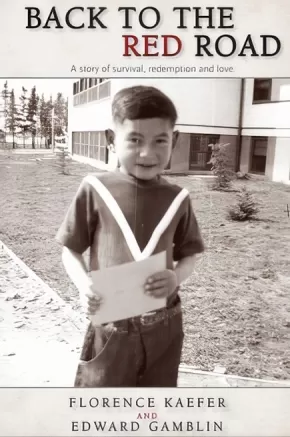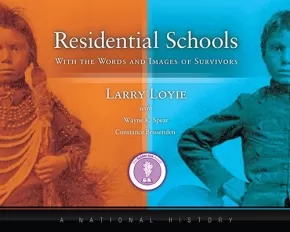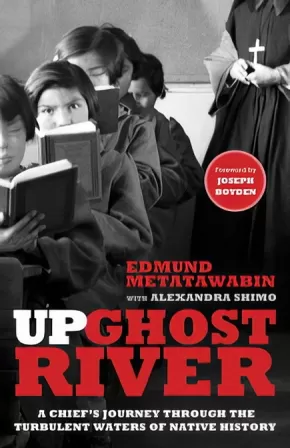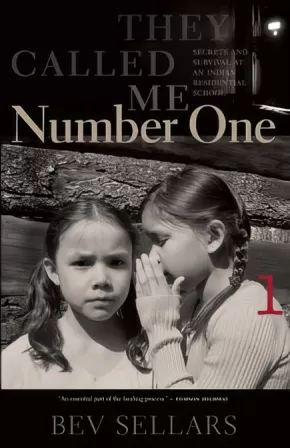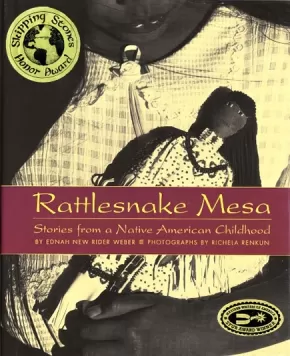Memoirs
Synopsis:
In this poetic, poignant memoir, Dene artist and social activist Antoine Mountain paints an unforgettable picture of his journey from residential school to art school—and his path to healing.
In 1949, Antoine Mountain was born on the land near Radelie Koe, Fort Good Hope, Northwest Territories. At the tender age of seven, he was stolen away from his home and sent to a residential school—run by the Roman Catholic Church in collusion with the Government of Canada—three hundred kilometres away. Over the next twelve years, the three residential schools Mountain was forced to attend systematically worked to erase his language and culture, the very roots of his identity.
While reconnecting to that which had been taken from him, he had a disturbing and painful revelation of the bitter depths of colonialism and its legacy of cultural genocide. Canada has its own holocaust, Mountain argues.
As a celebrated artist and social activist today, Mountain shares this moving, personal story of healing and the reclamation of his Dene identity.
Educator Information
Recommended in the Canadian Indigenous Books for Schools 2019-2020 resource list as being useful for grades 9 to 12 in the following subject areas: English Language Arts, Social Studies.
Included in this story are personal stories of residential school and addiction.
Additional Information
272 pages | 5.50" x 8.50"
Synopsis:
Freeman Douglas Knockwood is a highly respected Elder in Mi’kmaw Territory and one of Canada’s premier addictions recovery counsellors. The story of his life is one of unimaginable colonial trauma, recovery and hope.
At age 6, Knockwood was placed in the Shubenacadie Residential School, where he remained for a year and a half. Like hundreds of other Mi’kmaw and Maliseet children, he suffered horrible abuse. By the time he reached his twenties, he was an alcoholic. He contracted tuberculosis in the 1940s, had one lung and several ribs removed.
Having hit rock bottom, Knockwood, gained sobriety in his thirties through Alcoholics Anonymous. He went on to become a much sought after drug and alcohol rehabilitation counsellor in Canada. Many of Doug’s initiatives have been implemented across Canada and used by thousands of people, both Indigenous and non-Indigenous. Looking back now, says Doug, “I realize I wasn’t only helping them. They were helping me to gather strength in my presentations, in feeding them the knowledge I received, the same as it was fed to me. That helped me to gain confidence in myself; doing all these things that I didn’t know I could yet do”.
This book is an in-depth look at Doug Knockwood’s life that also casts a wide and critical glance at the forces that worked to undermine his existence and the indomitable spirit of a man who recovered from, yet still struggles to overcome, those forces.
Educator Information
The 2018-2019 Canadian Indigenous Books for Schools list recommends this resource for Grades 10-12 for these subjects: English Language Arts, Social Justice, Social Studies.
Additional Information
128 pages | 6.00" x 9.00" | Written by Doug Knockwood and Friends
Synopsis:
The Education of Augie Merasty offers a courageous and intimate chronicle of life in a residential school.
Now a retired fisherman and trapper, Joseph A. (Augie) Merasty was one of an estimated 150,000 First Nations, Inuit, and Metis children who were taken from their families and sent to government-funded, church-run schools, where they were subjected to a policy of "aggressive assimiliation."As Merasty recounts, these schools did more than attempt to mold children in the ways of white society. They were taught to be ashamed of their native heritage and, as he experienced, often suffered physical and sexual abuse.Even as he looks back on this painful part of his childhood, Merasty’s generous and authentic voice shines through.
Awards
- 2016 Burt Award Second Place Winner
Reviews
"At 86, Augie Merasty has been a lot of things: Father. Son. Outdoorsman. Homeless. But now he is a first-time author, and the voice of a generation of residential-school survivors.... The Education of Augie Merasty is the tale of a man not only haunted by his past, but haunted by the fundamental need to tell his own story... one of the most important titles to be published this spring." —Globe and Mail
"[Augie] wrote his memoir to show people the unbelievable atrocities suffered by so many Indigenous people and in the hope that others would come forward to tell their stories of what happened in the residential schools." —Eagle Feather News
"This book is so much bigger than its small size. It is a path to healing. We cannot change history, but we can acknowledge it, learn about it, and remember it." —Prairies North
"The Education of Augie Merasty might be a small book, but it carries a punch to it that all Canadian need to read and understand." —Rabble
"A truly extraordinary memoir by a truly extraordinary man." —Midwest Book Review
"Carpenter's introduction and afterword... allow us to come to better understand Augie's 'sometimes chaotic, sometimes heroic aftermath of his life,' as Carpenter describes his last decade. Where Augie focuses on physical scars, Carpenter's experiences with Augie illustrate the long-term impacts on his residential school experience. And with The Education of Augie Merasty, he helps Merasty--who could be any number of individuals we each pass on the street--find his voice." —Active History
"Unsettling and profound, and good." —Blacklock's Reporter
"In this book I have seen horror through eyes of a child." —James Daschuk, author of Clearing the Plains
"A story in which our entire nation has an obscure and dark complicity." —David Carpenter, co-author of The Education of Augie Merasty and author of The Gold and other books
Educator Information
The Canadian Indigenous Books for Schools list recommends this resource for Grades 9-12 English Language Arts and Social Studies.
Caution: Mature subject matter and descriptions of discrimination, sexual/physical violence, and substance abuse.
Additional Information
105 pages | 4.25" x 6.53" | Hardcover
Synopsis:
The compelling autobiography of Nick Sibbeston, residential school survivor and one of the North’s most influential leaders.
Growing up in a remote Northern community, Nick Sibbeston had little reason to believe he would one day fulfill his mother’s ambition of holding a career where he would “wear a white shirt.” Torn away from his family and placed in residential school at the age of five, Sibbeston endured loneliness, callous treatment and sexual assault by an older boy, but discovered a love of learning that would compel him to complete a law degree and pursue a career in politics.
As a young, firebrand politician, Sibbeston played an instrumental role during a critical moment in Northwest Territories politics, advocating tirelessly to support the economic and political development of First Nations people in the North, and participating in early discussions of the separation of Nunavut. Sibbeston’s career advanced in great strides, first as an MLA, then one of Canada’s first Aboriginal lawyers, then as a cabinet minister and eventually premier of the Northwest Territories. Finally, he was appointed to the Senate of Canada, where he continues to represent the people of Canada’s North, not least in advocating for the generations affected by residential school policies.
Although his years at residential school compelled Sibbeston to fight tirelessly for the rights of Aboriginal northerners, they also left a mark on his mental health, fuelling continual battles with anxiety, depression and addiction. It was only in later life that healing began to take place, as he battled his demons openly, supported not just by the medical community but also by his strong faith and the love of his wife and family.
Nick Sibbeston is a lawyer, distinguished member of the Northwest Territories (NWT) Legislative Assembly and a former premier. In 1970, Mr. Sibbeston was elected to a four-year term on the North West Territorial Council. And from 1979–91, he was elected to the NWT Legislative Assembly. Sibbeston has worked for the Government of NWT as Justice Specialist and as a Public Administrator for Deh Cho Health & Social Services and served four years on the Canadian Human Rights Panel/Tribunal. He is a current member of the Senate committees on Aboriginal Peoples, and Energy, Environment and Natural Resources. Mr. Sibbeston and his wife, Karen, live in Fort Simpson, NWT.
Additional Information
344 pages | 6.41" x 9.25"
Synopsis:
In June 1967, Norway House Indian Residential School of Manitoba closed its doors after a somewhat questionable past. In 1954, when Florence Kaefer was just nineteen, she accepted a job as a teacher at Norway House. Unaware of the difficult conditions the students were enduring, Florence and her fellow teachers nurtured a school full of lonely and homesick young children. After a few years, Florence moved to Vancouver Island with her new husband where she continued to teach, thinking often of the children of Norway House.
Many years later, after the death of her husband, Florence unexpectedly reconnected with one of her Norway House students, Edward Gamblin. Edward had been only five when he was brought to Norway House and Florence remembered him as a shy and polite young boy. Leaving the school at sixteen, Edward faced some challenges in a world that was both hostile and unfamiliar to him. But Edward found success and solace in his career as a musician, writing songs about the many political issues facing Aboriginal people in Canada. On a trip to Manitoba, Florence discovered Edward's music. She was captivated by his voice, but shocked to hear him singing about the abuse he and the other children had been subjected to at Norway House.
Motivated to apologize on behalf of the school and her colleagues, Florence contacted Edward. "Yes, I remember you and I accept your apology," Edward told her. "Reconciliation will not be one grand, finite act. It will be a multitude of small acts and gestures played out between individuals." The story of their personal reconciliation is both heartfelt and heartbreaking as Edward begins to share his painful truths with his family, Florence and the media. Three years after Edward's death in in 2010, Florence has continued to advocate for truth and reconciliation. BACK TO THE RED ROAD is more than one man's story: it is the story of our nation and how healing can begin, one friendship, one apology at a time.
Additional Information
|
Synopsis:
Residential Schools, With the Words and Images of Survivors, A National History honours the survivors, the former students, who attended residential schools. Designed for the general reader this accessible, 112-page history offers a first-person perspective of the residential school system in Canada, as it shares the memories of more than 70 survivors from across Canada as well as 125 archival and contemporary images (65 black & white photographs, 51 colour, some never before published).
This essential volume written by award-winning author Larry Loyie (Cree), a survivor of St. Bernard Mission residential school in Grouard, AB, and co-authored by Constance Brissenden and Wayne K. Spear (Mohawk), reflects the ongoing commitment of this team to express the truths about residential school experiences and to honour the survivors whose voices are shared in this book.
Along with the voices, readers will be engaged by the evocative, archival photographs provided by the Shingwauk Residential Schools Centre with the assistance of curator Krista McCracken. The book begins with the moving introduction by Larry Loyie, and moves to seven chapters that explore the purpose of this school system; cultures and traditions; leaving home; life at school the half-day system; the dark side of the schools; friendship and laughter coping with a new life; changing world–the healing begins; and an afterword. A detailed, full colour map showing residential schools, timeline with key dates, glossary, and a helpful index (including names of survivors and schools) make this vital resource a must-have for secondary, college, and universities, libraries, and the general reader.
Reviews
"A broad and comprehensive review of the history of First Nations, Métis, and Inuit peoples in Canada told from the perspective of First Peoples in a very accessible way. Any educator, regardless of personal background or heritage, would find this timely resource very useful in any classroom." — Gary Fenn and Domenic Bellissimo, executive assistants, Ontario Secondary School Teachers’ Federation
"Written with a gentle hand, this book describes a history that few Canadians understand or even know about. From the first page, those in search of the truth are engaged in a journey of learning, as they come to understand the true battle of Aboriginal peoples to preserve their cultures and pride. This story is a true account of resiliency and human spirit." — Tracy Zweifel, executive director, Sagitawa Friendship Society, Alberta
Awards
- 2016 Winner of Golden Oak award in Ontario's Forest of Reading program
Educator Information
This must-have resource includes a detailed, full-colour map showing residential schools, a timeline with key dates, and a glossary.
Recommended for grades 7-12, but would still be useful for adults and college/university courses studying residential schools and Indigenous history.
This book has been evaluated and approved by ERAC (Educational Resource Acquisition Consortium, British Columbia).
Additional Information
112 pages | 10.43" x 8.26"
Synopsis:
A powerful, raw yet eloquent memoir from a residential school survivor and former First Nations Chief, Up Ghost River is a necessary step toward our collective healing.
In the 1950s, 7-year-old Edmund Metatawabin was separated from his family and placed in one of Canada’s worst residential schools. St. Anne’s, in northern Ontario, is an institution now notorious for the range of punishments that staff and teachers inflicted on students. Even as Metatawabin built the trappings of a successful life—wife, kids, career—he was tormented by horrific memories. Fuelled by alcohol, the trauma from his past caught up with him, and his family and work lives imploded.
In seeking healing, Metatawabin travelled to southern Alberta. There he learned from elders, participated in native cultural training workshops that emphasize the holistic approach to personhood at the heart of Cree culture, and finally faced his alcoholism and PTSD. Metatawabin has since worked tirelessly to expose the wrongdoings of St. Anne’s, culminating in a recent court case demanding that the school records be released to the Truth and Reconciliation Commission.
Now Metatawabin’s mission is to help the next generation of residential school survivors. His story is part of the indigenous resurgence that is happening across Canada and worldwide: after years of oppression, he and others are healing themselves by rediscovering their culture and sharing their knowledge.
Coming full circle, Metatawabin’s haunting and brave narrative offers profound lessons on the importance of bearing witness, and the ability to become whole once again.
Synopsis:
Like thousands of Aboriginal children in Canada, and elsewhere in the colonized world, Xatsu'll chief Bev Sellars spent part of her childhood as a student in a church-run residential school.
These institutions endeavored to "civilize" Native children through Christian teachings; forced separation from family, language, and culture; and strict discipline. Perhaps the most symbolically potent strategy used to alienate residential school children was addressing them by assigned numbers only-not by the names with which they knew and understood themselves.
In this frank and poignant memoir of her years at St. Joseph's Mission, Sellars breaks her silence about the residential school's lasting effects on her and her family-from substance abuse to suicide attempts-and eloquently articulates her own path to healing. 'Number One' comes at a time of recognition-by governments and society at large-that only through knowing the truth about these past injustices can we begin to redress them.
Awards
- 2014 Burt Award Third Place Winner
Educator Information
Grades 10-12 BC English First Peoples resource for the unit Place-Conscious Learning - Exploring Text through Local Landscape.
Additional Information
256 pages | 5.67" x 8.20"
Synopsis:
After her beloved Grandmother dies, EdNah, a seven-year-old Pawnee girl, goes to live with a father she hardly knows on a Navajo reservation miles away. Heartbroken but resilient, she begins to create a new life for herself in this unfamiliar place.
Just as EdNah starts to feel at home in her new surroundings, she is sent away to a strict government-run Indian school. With her world turned upside down once again, EdNah must learn to rely on herself and her newfound community of friends.
Told in the unconventional voice of a seasoned storyteller, Rattlesnake Mesa is a true account of a girl coming-of-age during a complex time in America’s past. Both heartbreaking and humorous, you will be moved to tears and laughter as you experience EdNah’s spirited celebration of life as a healing.

